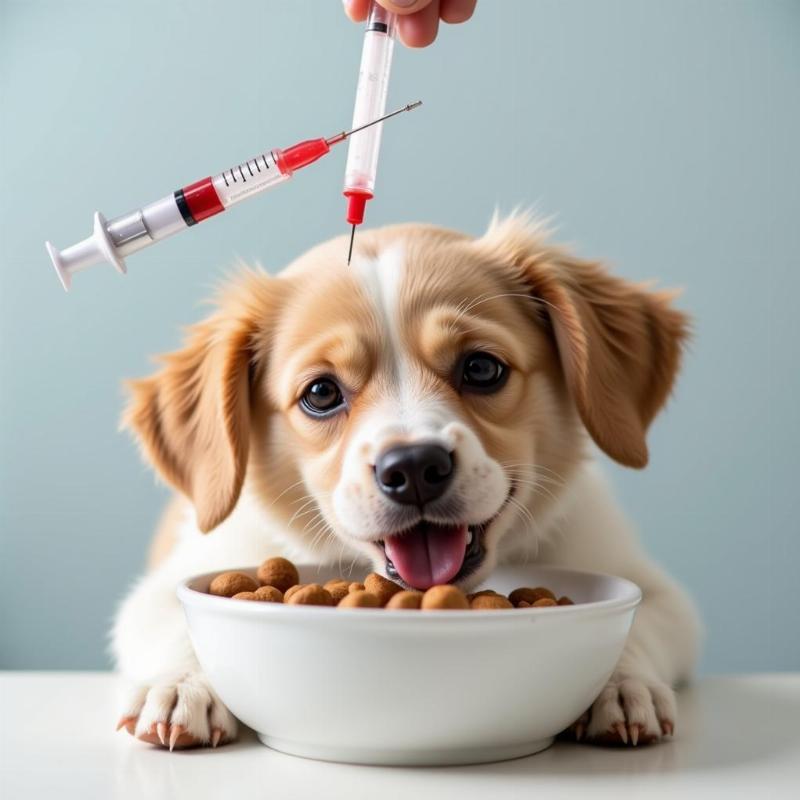Knowing whether your dog can eat before blood work is crucial for accurate test results. Feeding your dog before certain blood tests can significantly alter values, potentially leading to misdiagnosis or unnecessary further testing. This article provides a comprehensive guide for American dog owners on navigating the “can dogs eat before blood work” question, ensuring you’re prepared for your dog’s next vet visit.
Understanding the Importance of Fasting Before Blood Work
Why the fuss about food? Certain blood components are directly affected by what and when your dog eats. Lipids (fats) are a prime example. A recent meal can cause a temporary spike in blood lipid levels, giving a false impression of elevated cholesterol or triglycerides. Similarly, blood glucose (sugar) levels can fluctuate after eating. Accurate assessment of these values requires a fasting period to get a baseline reading, reflecting your dog’s true metabolic state. This is essential for diagnosing conditions like diabetes, pancreatitis, and liver disease.
 Dog Eating Before Blood Test
Dog Eating Before Blood Test
How Long Should My Dog Fast Before Blood Work?
Generally, veterinarians recommend a fasting period of 8-12 hours before blood work. This timeframe allows enough time for digested food to clear the system and provides a more accurate snapshot of your dog’s health. However, always follow your veterinarian’s specific instructions. They may recommend a shorter or longer fasting period depending on the specific tests being performed and your dog’s individual health status. Puppies and senior dogs, or those with certain medical conditions, may have different fasting requirements.
What About Water?
While food is generally restricted, water is typically allowed and even encouraged during the fasting period. Dehydration can affect blood test results, so ensure your dog has access to fresh water. This is especially important in warmer climates.
What Happens If My Dog Eats Before Blood Work?
If your dog accidentally snacks before their scheduled blood work, inform your veterinarian immediately. They may decide to postpone the test or proceed with caution, noting the potential impact of food on the results. Honesty is crucial to ensure the best possible outcome for your furry friend. Don’t try to hide a feeding mishap; it could compromise your dog’s health.
Tips for Managing Your Dog’s Fasting Period
Managing your dog’s fasting period can be a bit tricky, especially for food-motivated pups. Here are some tips to make the process smoother:
- Schedule strategically: Schedule your dog’s appointment for early morning so the fasting period falls overnight while they are sleeping.
- Remove food bowls: Remove food bowls from their reach the evening before the appointment.
- Distraction: Distract your dog with playtime, walks, or interactive toys to keep their mind off food.
- Positive reinforcement: Reward your dog with praise and affection for their cooperation.
Special Considerations for Puppies, Senior Dogs, and Diabetic Dogs
Puppies and senior dogs may have different fasting requirements due to their unique metabolic needs. Consult your veterinarian for specific guidance. Diabetic dogs require special attention. Good treats for diabetic dogs are important to manage their blood sugar levels. Discuss with your veterinarian how to manage their insulin and feeding schedule before blood work.
Are There Any Exceptions to Fasting Before Blood Work?
Some routine wellness blood tests may not require fasting. However, it’s always best to confirm with your veterinarian. Certain tests, such as those for internal infection after spaying dog, may also have different requirements.
“Ensuring accurate blood test results is paramount for effective diagnosis and treatment,” says Dr. Emily Carter, DVM, a leading veterinary specialist in New York. “Following your veterinarian’s fasting instructions plays a crucial role in this process.”
“Remember,” adds Dr. Carter, “open communication with your veterinarian is key. Don’t hesitate to ask questions or express any concerns about your dog’s fasting period.”
Conclusion
Understanding the “can dogs eat before blood work” question is essential for responsible dog ownership. By following your veterinarian’s instructions and managing the fasting period effectively, you’ll contribute to accurate diagnoses and appropriate treatment plans for your beloved companion. Accurate blood work is a cornerstone of effective veterinary care, ensuring your dog receives the best possible medical attention.
FAQ
- Can my dog drink water before blood work? Yes, water is generally allowed and encouraged during the fasting period.
- What if my dog sneaks a treat before the test? Inform your veterinarian immediately. They will determine the best course of action.
- How long do most dogs need to fast before blood work? Typically, 8-12 hours, but always follow your veterinarian’s specific instructions.
- Are there any exceptions to the fasting rule? Some routine tests may not require fasting, but always confirm with your vet.
- Why is fasting important for accurate blood test results? Fasting helps eliminate the influence of recently consumed food on certain blood components, providing a more accurate baseline reading.
- What are the potential consequences of not following fasting instructions? Inaccurate results could lead to misdiagnosis or unnecessary additional testing.
- What if my dog has a medical condition like diabetes? Consult your vet for specific instructions on managing their insulin and feeding schedule before blood work.
Related Articles
- Training a Blood Tracking Dog
- How Much is a Blood Test for a Dog
- Natural Teeth Cleaning Treats for Dogs
Beautdogs.us is your trusted resource for all things dog-related in the US. We offer comprehensive information on dog breeds, care, training, and products. Whether you’re a new dog owner or a seasoned expert, Beautdogs.us provides reliable guidance and support every step of the way. From understanding breed specifics to finding the perfect natural teeth cleaning treats for dogs, we’re here to help you navigate the joys and responsibilities of dog ownership. Connect with us today for expert advice: Email: [email protected], Phone: +1 501-555-7529. Beautdogs.us – Your ultimate guide to a happy and healthy canine companion.